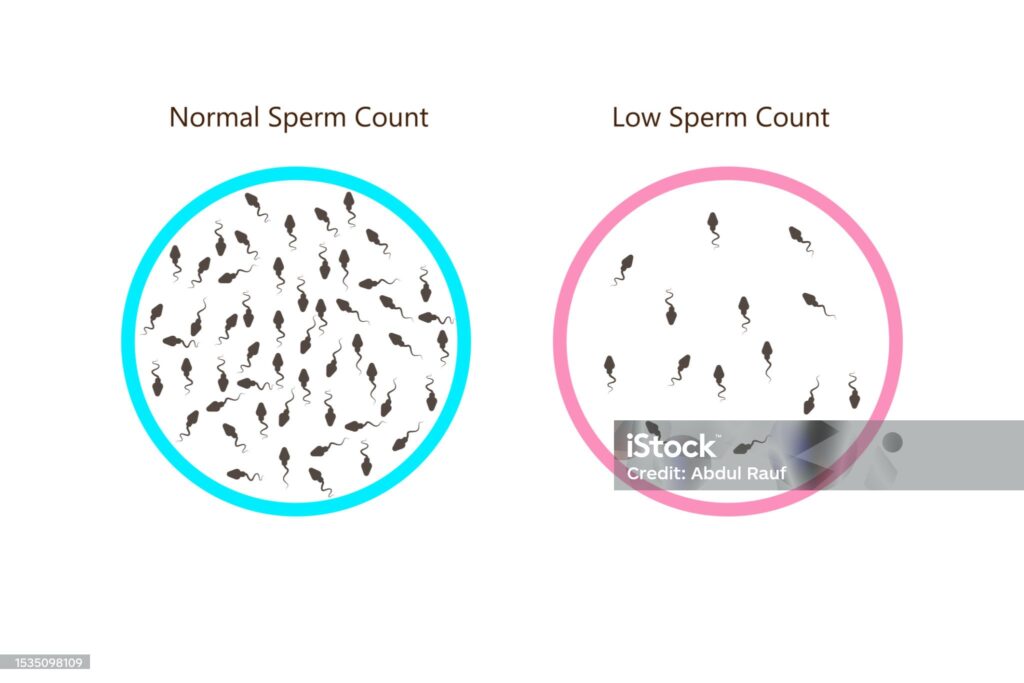Low sperm count is one of the most common causes of male infertility, affecting millions of men globally. It simply means that the semen (the fluid ejaculated during sex) contains fewer sperm cells than normal. This condition reduces the chances of fertilizing a woman’s egg, making it harder to conceive. In this article, we’ll break down what low sperm count means, what causes it, symptoms to look out for, and how it can be treated.
What Does Healthy and Unhealthy Sperm Look Like?
A healthy sperm usually has:
A normal oval-shaped head
A straight midsection
A long, active tail that helps it swim efficiently
Healthy sperm also appear whitish and thick when ejaculated.
On the other hand, unhealthy sperm may:
Have misshaped or double heads
Have coiled or weak tails
Be less mobile (poor motility)
Semen may look watery or yellowish in cases of low sperm count or infection.
What Is Considered a Low Sperm Count?
A sperm count of 15 million sperm per milliliter or less is generally considered low. Normal sperm count ranges from 15 million to over 200 million sperm per milliliter of semen.
Causes of Low Sperm Count
There are many reasons why a man may have low sperm count. Here are some of the most common causes:
1. Medical Causes
Varicocele: Swelling of the veins in the scrotum, which affects sperm production.
Infections: Such as sexually transmitted infections (STIs) or mumps affecting the testicles.
Hormonal Imbalance: Low testosterone levels can reduce sperm production.
Ejaculation Issues: Retrograde ejaculation or blockages in the reproductive system.
Undescended Testicles: A condition from birth where the testicles fail to move down into the scrotum.
2. Lifestyle Factors
Smoking and alcohol use: These reduce sperm quality and count.
Drug abuse: Using cocaine, marijuana, or anabolic steroids affects sperm.
Obesity: Excess fat can cause hormonal changes that reduce sperm count.
Lack of exercise: Can lead to poor blood flow and low testosterone.
3. Environmental Causes
Overheating the testicles: Frequent use of hot tubs, saunas, or tight underwear.
- Exposure to toxins: Pesticides, heavy metals, and industrial chemicals.
- Radiation or X-rays: Can harm sperm-producing tissues.
Symptoms of Low Sperm Count
Most men with low sperm count don’t notice any obvious symptoms until they struggle with infertility. However, some signs may include:
Difficulty conceiving a child
Low sex drive
Erectile dysfunction
Pain or swelling in the testicles
Abnormal semen texture
How Is Low Sperm Count Diagnosed?
A doctor will request a semen analysis to check:
Sperm count
Shape (morphology)
Movement (motility)
Volume and thickness of semen
Other tests may include hormone level checks, scrotal ultrasound, or urine tests after ejaculation.
Treatment for Low Sperm Count
Treatment depends on the underlying cause. Some common treatment options include:
Lifestyle changes: Quit smoking, reduce alcohol, maintain a healthy weight, and avoid overheating the testicles.
Medications: Hormonal treatments and antibiotics for infections.
Surgery: To correct varicocele or remove blockages.
Assisted Reproductive Techniques (ART): Such as Intrauterine Insemination (IUI) or In Vitro Fertilization (IVF).
When to See a Doctor
If you and your partner have been trying to conceive for over a year without success, it’s time to consult a medical professional. The sooner the issue is identified, the quicker you can find a solution.
Don’t wait or self-diagnose. Speak with a qualified doctor today on the Virtual Doctors App. It is fast, affordable, and confidential.
👉 Register to book an appointment now
👉 Download Virtual Doctors Healthplus App on Google Play
Low sperm count is a common but treatable condition. By understanding the causes, symptoms, and available treatments, you can take steps to improve your fertility. Early intervention and proper medical guidance can make a big difference in your chances of becoming a father.
